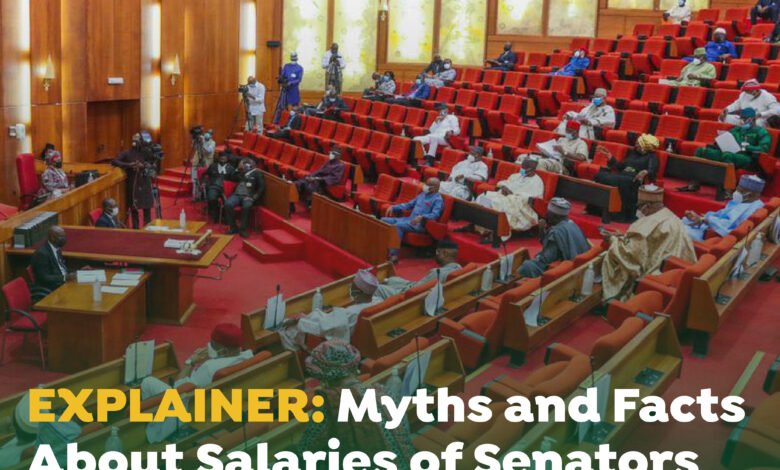
The salaries of Senators in Nigeria have been a topic of interest and controversy in recent years.
Many Nigerians are curious about how much their elected representatives earn, and whether their salaries are justified considering the country’s economic challenges.
Unfortunately while ordinary Nigerians have ignorantly championed FALSE narratives, those who should know have also sold information that is INCORRECT to the public.
Just recently, former President Olusegun Obasanjo criticized the National Assembly for determining its own salaries and allowances, calling it “immoral”.
He argues that the Revenue Mobilisation Allocation and Fiscal Commission (RMAFC) should set their earnings, not lawmakers themselves.
Obasanjo also alleged that lawmakers receive excessive allowances and claimed they received N200 million in some cases, a claim that has been vehemently denied by the Lawmakers who say what obtained when Obasanjo was in power and under the President Bola Tinubu administration are starkly different.
Myths & Facts
In setting the records straight, here are some of the myths and facts about salaries of Senators in Nigeria.
One of the myths surrounding the salaries of Senators is that they fix their own salaries.
However, this is not true. The Senate does not have the constitutional power to determine the salaries and allowances of its members.
Salaries and allowances are fixed by the Revenue Mobilisation Fiscal Allocation Commission (RMAFC).
As Senate spokesperson, Yemi Adaramodu, stated, “The senators or the National Assembly do not and cannot fix their salaries. Any suggestions to the contrary are uncharitable and satanic.”
Another myth is that Senators receive incentives from the presidency. The Senate has denied receiving such incentives. The N100 billion constituency projects funds are meant for projects, not the lawmakers’ personal use. As Adaramodu explained, “No Senator has received any monetary patronage from the Presidency. The mischievously touted constituency projects are not for the legislators. They are only suggested and nominated by the legislators in accordance with the practice in other democracies worldwide…”
There is also a misconception that Senators’ salaries are not transparent. However, the total monthly entitlement of each senator as salary and allowances is about N1 million (N1,063,860), as prescribed by the RMAFC package.
This includes basic salary, motor vehicle fueling and maintenance allowance, personal assistant pay, domestic staff allowance, entertainment allowance, utilities, newspapers/periodicals allowance, wardrobe allowance, house maintenance allowance, and constituency allowance.
According to RMAFC spokesperson, Ibrahim Mohammed, “The total monthly entitlement of each senator as salary and allowances is about N1 million (N1,063,860).”
While it is true that Senators receive “running costs” in addition to their salaries, the amount is not disclosed.
However, former Senator Shehu Sani confirmed receiving N13.5 million monthly as “running cost” in addition to his salary and allowances.
While there are repeated and justifying calls for the reduction of the cost of governance, it is essential to separate myths from facts when it comes to the salaries of Senators in Nigeria.
By understanding how much they earn and how their salaries are determined, Nigerians can make informed decisions and hold their elected representatives accountable.
As Adaramodu assured, “The 10th Senate is a responsible and responsive chamber, hence would not do anything that can harm the economy and growth of Nigeria…”




